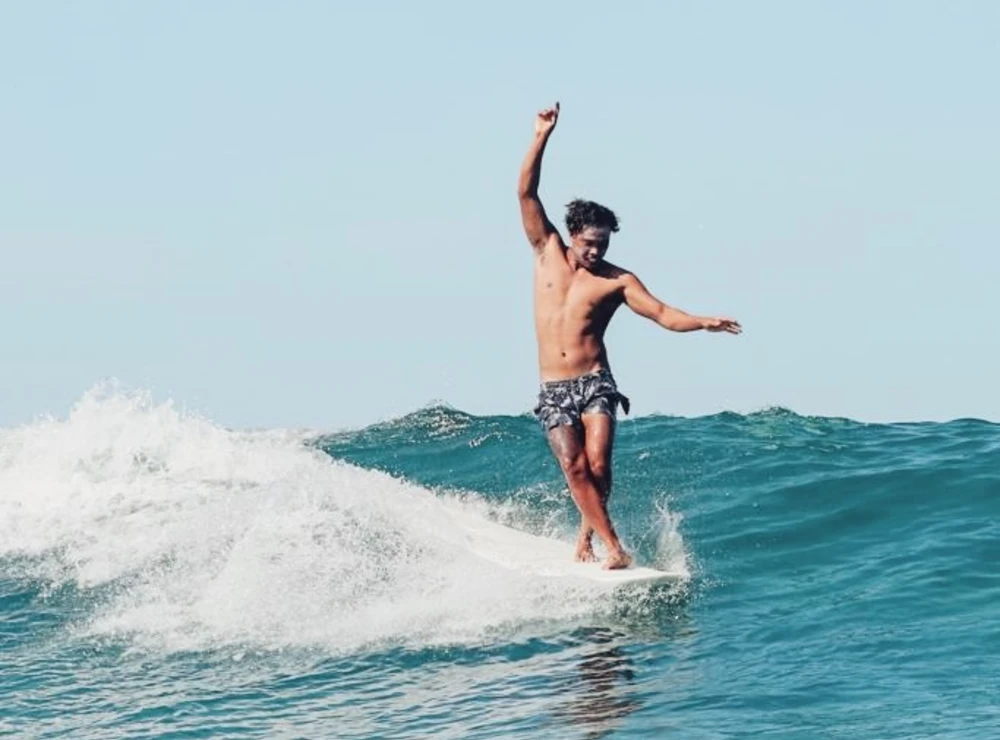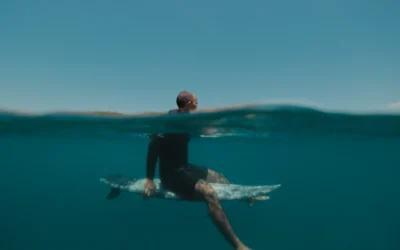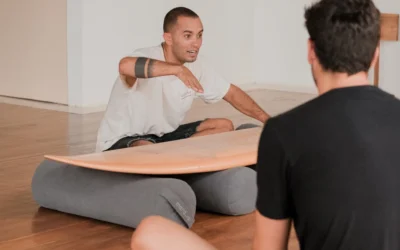One of our most common poolside topics at the Xanadu locations is how long it takes to get good at surfing.
It’s a reasonable question too. When you finally master your pop-up and begin catching waves, you’ll be hooked. This naturally leads you to wonder how long it takes before you’re cross-stepping and hanging ten like your new idols.
But asking how long it takes to get good at surfing is like asking how long a surfboard is.
It depends.
After thousands of guests and dozens of surf retreats though, we think we can give you a reasonable answer.
Here’s everything you need to know about the surfing learning curve and how long it takes to become a proficient surfer.
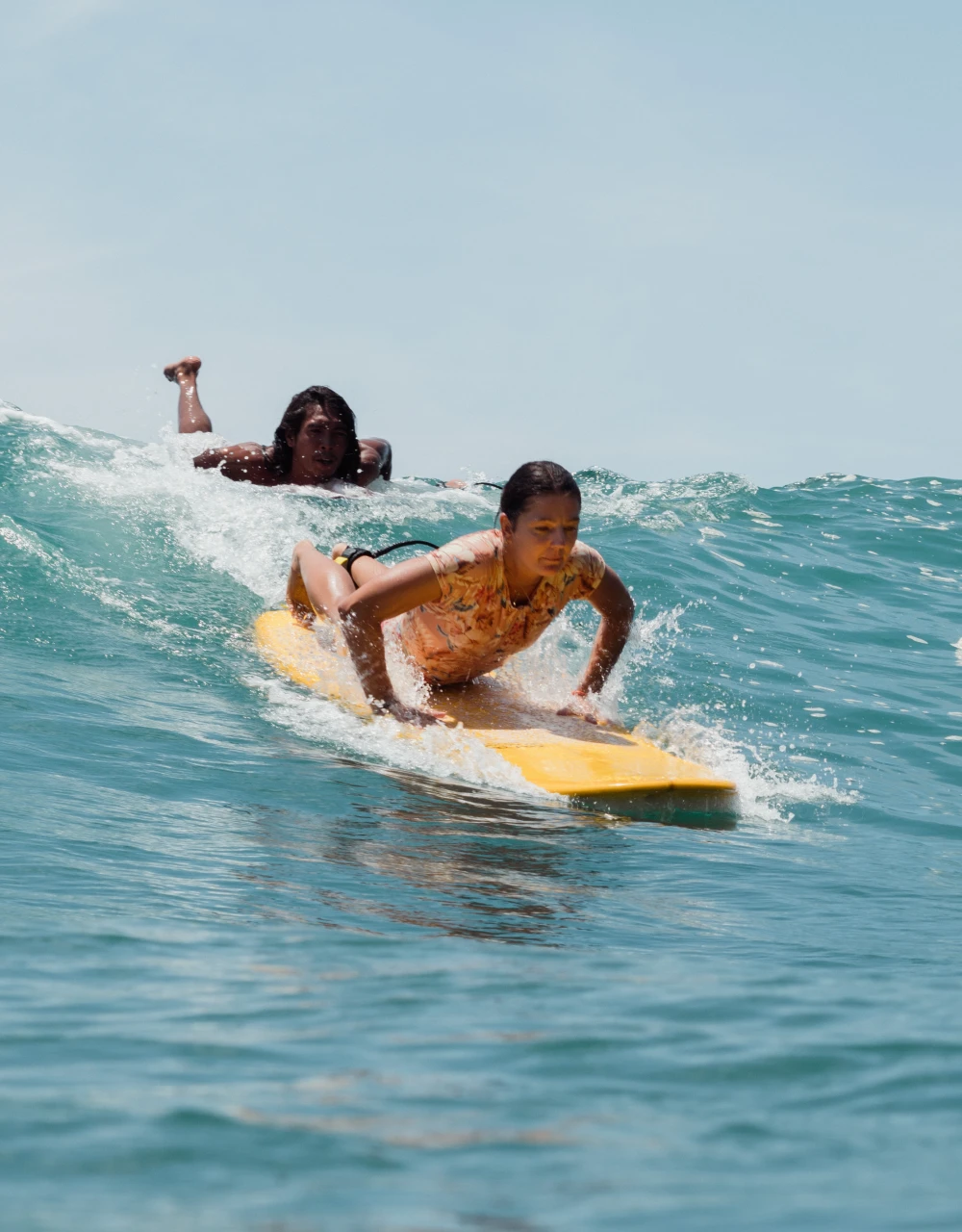
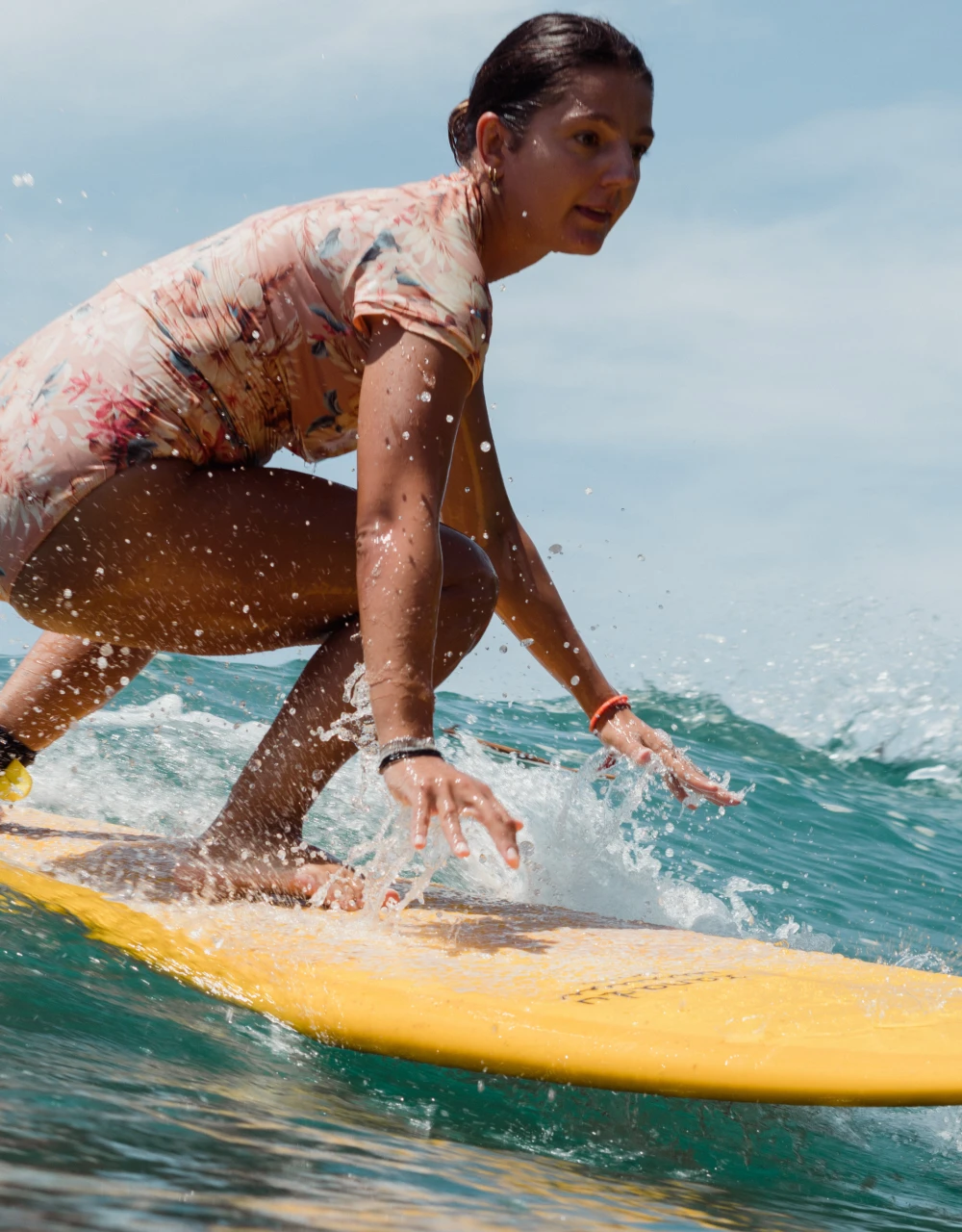
What’s your definition of “good”?
First things first. What’s your definition of “good” surfing?
Do you see yourself surfing big waves and getting barrelled? Are you more inclined to cruise and enjoy the feeling of gliding over the water?
Everyone has a different idea of what “good” surfing looks like, and there’s no right or wrong answer.
“Good” is such a relative term.
If you’ve never surfed before, you might consider standing up and going straight “good”. If you’ve been surfing for years, “good” might mean hanging ten toes over the nose.
To us, good surfing isn’t so much about the tricks and manoeuvres you can do, but rather the style and composure with which you surf.
So before you try to put a timeline on your surfing progression, think about what “good” means to you personally.
What makes surfing a tricky activity to master?
There are many factors that influence the difficulty of mastering surfing as a sport.
Some factors are internal and can be controlled by the individual, while others are external and cannot be changed.
Knowing these factors can help you better understand the learning curve and how long it might take for you to become a proficient surfer.
Here are a few things to consider.
Physical fitness
You needn’t be ripped or ultra fit to become a good surfer, but it certainly helps to have a basic level of physical fitness.
Surfing requires core strength, balance and endurance.
If you’re starting from scratch with little to no athletic background, it may take longer for your body to adjust and develop the necessary skills.
→ What level of fitness is required to learn surfing
Access to good waves
Live in a landlocked country? Work away from the coast? Ride waves that are low quality?
The better the waves, the more you can surf and the faster you can improve.
In our opinion, surfing in blocks is one of the cheat codes for faster progression. Because you’re able to surf back-to-back days, you’ll be better placed to refine your style.
Surfing once or twice a month per year might sound like a lot, but getting better is all about stacking those sessions one after the other.
Appropriate surfboard
If there’s one thing that affects your progression arc it’s having the wrong surfboard.
We see it time and time again: people let their ego dictate the size or shape of their board, or they’re given poor advice by a mate who’s “been surfing for years” but in actual fact is no more than an overconfident beginner.
Having an appropriate surfboard that is suited to your level and the conditions will make a huge difference in how fast you progress.
Time constraints
Life has a habit of throwing up roadblocks.
Work schedules, family commitments and other hobbies can limit the amount of time you have to dedicate to surfing.
Without regular and consistent practice, it takes longer to get good.
There’s no getting around these, but they do play a role in how quickly you’ll learn.
Mental mindset
Surfing is an epic pastime that’ll bring you more joy than you can imagine.
But like anything in life, there will be challenges and frustrations along the way.
Having a positive and patient mindset is crucial in overcoming these obstacles and continuing on the learning curve.
The surfing learning curve explained
Because of the ever-changing nature of the ocean and the fact that every surf session is unique, it’s challenging to say exactly how long it takes for someone to get good at surfing.
Generally, learning to surf is a dance between progression and regression.
You’ll have a good session or two, catch a few amazing waves and feel on top of the world. Then, after one particularly challenging session or a coastal hiatus, you’ll feel like you’ve regressed and lost all your progress.
This is part of the learning process with surfing. It’s not a linear line to mastery, but rather a series of peaks and troughs.
We can’t count how many times we’ve caught a huge wave, pulled off a technical manoeuvre or even got barrelled, only to see the footage later on and realise it wasn’t as impressive as we thought.
You should be grateful with every chance you have to surf, for sure, but there’s no denying that it has one of the trickiest learning curves of any activity.
How long does it take to become a good surfer?
As we’ve noted, the rate in which you get good at surfing depends on many factors. So you should take the following timeline with a grain of sea salt.
Athletic people with great swimming skills can become relatively proficient within weeks. However, anyone regardless of the shape they’re in can progress quickly with the right mindset.
Here’s our estimated timeline for how long it takes to become a good surfer.
Note: The time frames provided are based on someone who is surfing for at least two weeks per year in one block. Intermittent surf sessions or an extended break of one year or more will affect how fast you progress.
1 to 2 weeks
- You can stand up on a surfboard and ride small green waves
- You’re primarily surfing at beginner surf spots or gentle beach breaks
- You’ll be surfing with other beginner surfers
- You’ll need assistance identifying which waves are good
- You’ll also need help choosing the appropriate equipment
1 to 4 months
- You’re well on your way to mastering the pop-up
- You can also reach the lineup by yourself and catch waves without assistance
- Your style is yet to develop and you still need some direction
- But you can surf independently on small to medium-sized waves
6 months to 2 years
- You’ve mastered the fundamentals and are starting to develop your own style
- You can consistently catch waves and perform basic manoeuvres
- You’re mingling with other surfers and making steady progress
- You’re getting comfortable taking on larger waves and trying more advanced techniques
- You can surf independently in most conditions
3 to 6 years
- You can surf practically anywhere and confidently take on all types of waves
- You have a well-defined style and can execute more technical manoeuvres with ease
- You’re experimenting with different equipment and pushing yourself to try new things in the water
- You’ll be surfing different wave breaks, such as reef breaks, point breaks and beach breaks
- Most importantly, you’re beginning to realise that you have much more to learn
10 years or more
- After a decade or more of consistent dedication and practice, you’ll likely have reached a level of mastery in surfing
- You catch plenty of waves and have complete control over your board and body in the water
- You can read the ocean with precision and consistently
- You know your limits but are always pushing to improve and try new things
- You can crossover from longboarding to shortboarding and maintain a high level of skill
How can you become a more confident surfer, faster?
Wondering how you can speed up your surfing skills? Truth be told, you can’t rush becoming a competent surfer.
To rush your surfing journey is to put your style at risk, as you’ll be more prone to picking up bad habits.
However, there are a few things you can do to become a more confident surfer, faster.
- Start by booking surf lessons with a surf school or surf retreat
- Use video analysis to identify and improve your technique
- Regularly surf with people who are better than you, but not too far ahead in skill level that it’s discouraging
- Practice consistently and play around with different equipment
- Brush up on your ocean knowledge by chatting with more experienced surfers
- Work on your overall fitness with a focus on core and upper body strength
- Practice your pop-up at home to develop muscle memory
- Try freestyle swimming when you’re not surfing to improve your paddle power and endurance
- Watch videos or read interviews with professional surfers and study their technique and approach to the waves
- Go on surf trips that emphasise progression and coaching, rather than just catching waves
- Have fun and enjoy the process!
Final thoughts
Most people can get good at surfing after mere months, but there are layers upon layers of progression to keep you engaged for a lifetime.
Remember that surfing is not just about the destination, but also the journey. Be patient, enjoy the process and always strive to improve.
We might be biased, but surf trips that focus on progression and coaching in a supportive environment with yoga and healthy food are the ultimate way to speed up your skills.
Make learning to surf fun and fast. Book your next surf trip with us!

